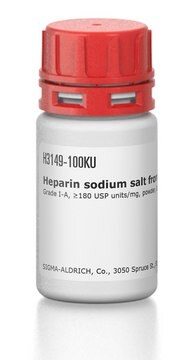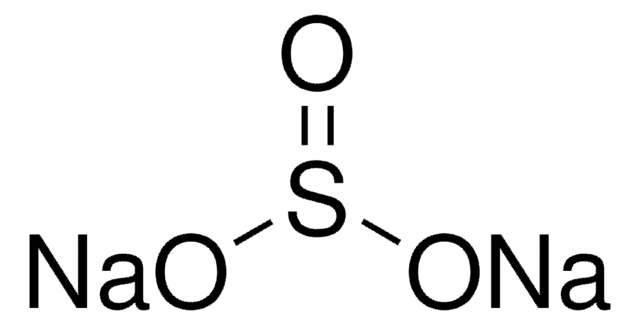S9000
Sodium metabisulfite
ReagentPlus®, ≥99%
Sinónimos:
Sodium disulfite, Sodium pyrosulfite
About This Item
Productos recomendados
Nivel de calidad
Línea del producto
ReagentPlus®
Análisis
≥99%
formulario
powder
pH
4.5 (20 °C, 50 g/L)
mp
>300 °C (lit.)
cadena SMILES
[Na+].[Na+].[O-]S(=O)S([O-])(=O)=O
InChI
1S/2Na.H2O5S2/c;;1-6(2)7(3,4)5/h;;(H,1,2)(H,3,4,5)/q2*+1;/p-2
Clave InChI
HRZFUMHJMZEROT-UHFFFAOYSA-L
¿Está buscando productos similares? Visita Guía de comparación de productos
Categorías relacionadas
Aplicación
- Sickle Erythrocyte Health Index: Discusses the use of sodium metabisulfite in stabilizing red blood cells for advanced computational analysis, crucial for the diagnosis and management of sickle cell disease (Ansong-Ansongton YON, Adamson TD, 2024).
- Chemical and Thermal Treatment for Drying Cassava Tubers: Explores sodium metabisulfite′s role in enhancing the drying process of cassava, focusing on optimizing microstructure and dehydration kinetics, which is vital for food preservation and processing (Nainggolan EA, Banout J, Urbanova K, 2023).
- Anionic Bio-flocculants from Sugarcane: Discusses the development of bio-flocculants using sodium metabisulfite for the purification of sucrose, demonstrating its potential in enhancing the sustainability of sugar processing industries (Leão S, Magalhães S, et al., 2023).
Otras notas
Información legal
Palabra de señalización
Danger
Frases de peligro
Consejos de prudencia
Clasificaciones de peligro
Acute Tox. 4 Oral - Eye Dam. 1
Riesgos supl.
Código de clase de almacenamiento
11 - Combustible Solids
Clase de riesgo para el agua (WGK)
WGK 3
Punto de inflamabilidad (°F)
Not applicable
Punto de inflamabilidad (°C)
Not applicable
Certificados de análisis (COA)
Busque Certificados de análisis (COA) introduciendo el número de lote del producto. Los números de lote se encuentran en la etiqueta del producto después de las palabras «Lot» o «Batch»
¿Ya tiene este producto?
Encuentre la documentación para los productos que ha comprado recientemente en la Biblioteca de documentos.
Los clientes también vieron
Nuestro equipo de científicos tiene experiencia en todas las áreas de investigación: Ciencias de la vida, Ciencia de los materiales, Síntesis química, Cromatografía, Analítica y muchas otras.
Póngase en contacto con el Servicio técnico











